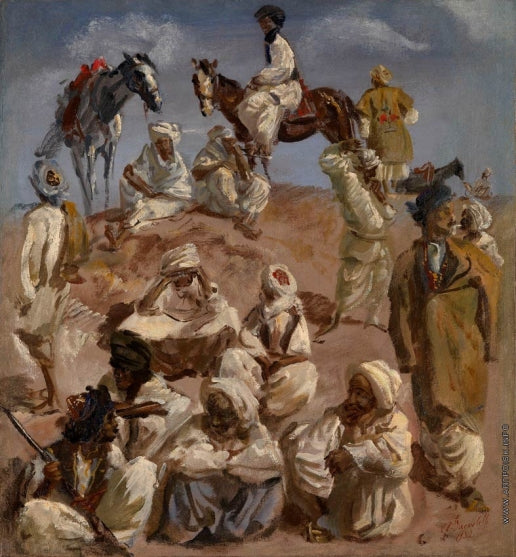Description
The work "Afghan - 1932" by Alexandre Jakovleff, also known as Alexander Yakovlev, is a representation rich in nuances of the region and Afghan culture, embodied through the acute and detailed look of an artist who knew how to capture the essence of the place and its inhabitants. Born in Russia in 1887, Yakovlev developed a career that led him to become an outstanding painter and portraitist of the twentieth century, with a legacy marked by his ability to document and celebrate the cultural diversity of the world.
In "Afghas - 1932", Jakovleff presents us with a scene dominated by the imposing presence of four male figures. The composition is carefully organized, placing the characters in a hierarchical placement that subtly guides the viewer's gaze. Men, dressed in traditional clothing, are represented with a meticulous attention to detail that highlights the textures and patterns of their clothes, which include turns and layers adorned with embroidery and intricate designs, characteristics of the Afghan attire.
Men's faces are especially worthy of attention. Each one, with its unique expressions and facial characteristics, brings a silent but powerful narrative to painting. The color palette used by Jakovleff is sober but effective, predominantly composed of earth, ocher and gray tones that harmonize with the mountainous landscape in which these characters could be located. These colors not only highlight the austerity of the environment, but also highlight the nobility and solemnity of the portrayed men.
Jakovleff's technique stands out for its ability to combine the precise drawing with the expressive use of color, a duality that gives its works a visual dynamism and emotional depth that is palpable in "Afghan - 1932". The light, although dim, is handled in such a way that it accentuates the facial features and the folds of the clothing, creating a balance between the real and the pictorial.
Alexandre Jakovleff was not only a painter but also a great traveler and ethnographer. His trips through Asia, Africa and Europe allowed him to immortalize in his canvases the richness of various cultures and landscapes. This work, in particular, is part of his series of works that document his scientific expeditions with the Croisière Noire and the Croisière Jaune organized by Citroën, in which he sought to reflect the authenticity and humanity of the peoples he knew.
Compared to other works of the same era, "Afghas - 1932" aligns with the current of orientalism, which was in vogue between certain artistic and literary circles. However, Jakovleff's gaze is less romantized and more documentary, which gives his works with an additional historical and anthropological value.
In conclusion, "Afghas - 1932" is a piece that not only demonstrates the technical mastery of Alexandre Jakovleff, but also reflects his deep connection with the subjects of his works. It is a visual testimony of a specific time and place, taken to life through the brush of a true master that he ventured beyond the confines of his own world to explore and document the beauty and diversity of our shared humanity.
KUADROS ©, a famous paint on your wall.
Hand-made oil painting reproductions, with the quality of professional artists and the distinctive seal of KUADROS ©.
Art reproduction service with satisfaction guarantee. If you are not completely satisfied with the replica of your painting, we refund your money 100%.

